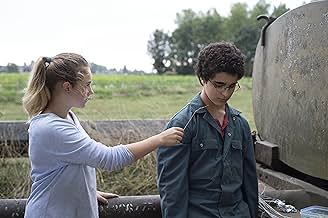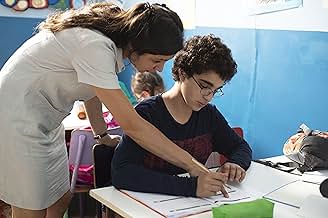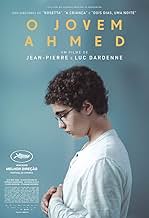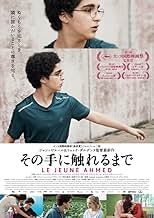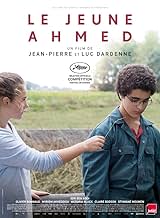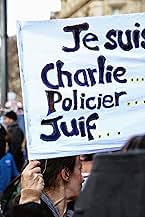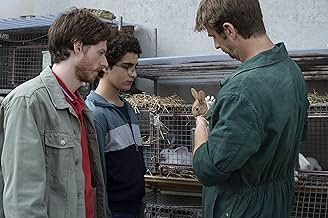A Belgian teenager hatches a plot to kill his teacher after embracing an extremist interpretation of the Quran.A Belgian teenager hatches a plot to kill his teacher after embracing an extremist interpretation of the Quran.A Belgian teenager hatches a plot to kill his teacher after embracing an extremist interpretation of the Quran.
- Directors
- Writers
- Stars
- Awards
- 5 wins & 12 nominations total
Eva Zingaro
- Psychologue du centre
- (as Eva Zingaro-Meyer)
- Directors
- Writers
- All cast & crew
- Production, box office & more at IMDbPro
Featured reviews
The Dardenne brothers linger, during 80 minutes, to a subject as cleaving as delicate: obscurantism and radicalization. Although the atmosphere is neat, the psychology of the characters is not elaborate enough. Thus, the character of Ahmed interpreted by Idir Ben Addi is definitely not credible: he looks like a harmless kid with a baby face. I can not believe such a child might fool adults so easily. As a matter of fact, the film is essentially based on this character who may then be considered as the keystone of a cinematographic structure. This keystone being defective, the structure collapses! Moreover, the rhythm of the film is a bit sluggish, even if this feeling is possibly due to my global lack of interest for the movie. In short: disappointing! 4/5 of 10.
At first I want to establish a few things, first that I'm a Muslim person who live in an Islamic country which is Egypt, the second is that I like The Dardennes' cinematic language and I liked (Deux jours, une nuit) so much.
There is no actual plot, the movie is just going nowhere and doesn't follow the three acts structure. The movie is a character study movie but our main character is such a flat, unrealistic and caricature character. How can a kid be like that? How can a kid have this kind of thoughts? How can a kid have this cruelty? How can a kid have this insist on doing this kind of a violent act? It was a flat character who didn't change too much from the beginning to the end. The movie represents the idea of accepting people even if they tried to hurt you, but why did the Dardenne brothers put Muslims as the bad guys? Actually why are we treated as the bad guys from everyone? Bin-Laden? come on look at Hitler or Stallin. Whatever we are the stereotype of violence now so why do I whine.
The Dardenne brothers still have their cinematic tools like the long takes, shaky camera and not using a music. And like I said I liked it in (Deux jours, une nuit) But in this movie actually these tools made the movie slow paced and boring most of the time.
At the end I didn't like the movie at all, It wasn't entertaining and its ideas were biased.
There is no actual plot, the movie is just going nowhere and doesn't follow the three acts structure. The movie is a character study movie but our main character is such a flat, unrealistic and caricature character. How can a kid be like that? How can a kid have this kind of thoughts? How can a kid have this cruelty? How can a kid have this insist on doing this kind of a violent act? It was a flat character who didn't change too much from the beginning to the end. The movie represents the idea of accepting people even if they tried to hurt you, but why did the Dardenne brothers put Muslims as the bad guys? Actually why are we treated as the bad guys from everyone? Bin-Laden? come on look at Hitler or Stallin. Whatever we are the stereotype of violence now so why do I whine.
The Dardenne brothers still have their cinematic tools like the long takes, shaky camera and not using a music. And like I said I liked it in (Deux jours, une nuit) But in this movie actually these tools made the movie slow paced and boring most of the time.
At the end I didn't like the movie at all, It wasn't entertaining and its ideas were biased.
Summary
In the current context of the resurgence of neo-fascism and with a World Cup about to be held in a misogynistic and homophobic Islamic theocracy, it is opportune to see the 2018 film in which the Dardenne brothers bravely tackled Muslim youth fundamentalism, establishing a successful cross between the psychology of the solitary leading character, the context in which he moves and certain precepts of Islam, without this being relativized or blurred.
The women act as disturbers, opponents and challengers of Islam's religious and macho misogyny embodied in the impenetrable, resolute, fanatical and tenacious teenager Ahmed, a young out-of-place radical for whom violence ends up being as natural as it is inevitable.
Review
The film follows Ahmed, a Muslim teenager from a Belgian village, who does not hesitate to resort to violence based on his interpretation of the imam's teachings on him and the Koran.
This time the Dardenne brothers face a thorny issue, and they do it frankly and without fear. I say without fear because they do not fear that by addressing the issue of Islamic fundamentalism they will be branded as Islamophobes.
The film rightly establishes a cross between the psychology of the character, the context in which he moves and certain precepts of Islam, but without this being relativized or blurred by the former. They are three dimensions that enhance each other.
There is an inevitable clash (and some irony) between the secularism of the Belgian public school and the objections of some Muslim parents who oppose for religious reasons the proposals of Ahmed's teacher of Arab origin.
An important aspect that went unnoticed by the critics is the centrality in the history of women as threats, opponents and challengers of Islam's religious and sexist misogyny, as representatives of evil that must be avoided, combated and even eliminated. It is the female figures (the mother, the sister, his teacher Inés and another that I will not reveal) who assume the destabilizing role of an Ahmed who combines his fear of female contact with a religious precept that demonizes him, while the Imam Youssuf assumes the role of the absent father, guarantor of the rules, whose teachings the young man combines with those of a religious leader who follows the web.
Another interesting aspect is that The Young Ahmed does not follow the process of religious radicalization of the adolescent, but rather the character is already approached with such a degree of fanaticism that it only remains for him to take him to the field of a violence that is as natural as it is inevitable for him. On the other hand, he is illustrative of how the system faces and seeks to redirect these situations, emphasizing respect and containment.
The Dardenne resort to their usual dry tone, with handheld camera moments that reinforce a realism supported by the presence of actors unknown to the general public. Idir Ben Addi assumes the difficult and at times unpleasant role of an impenetrable, determined, fanatical and tenacious adolescent, with an opacity that sustains an unpredictability that adds elements of a thriller to the psychological and social drama, in a story that is even more disturbing to present to us. To an unincorporated fundamentalist who acts completely on his own.
In the current context of the resurgence of neo-fascism and with a World Cup about to be held in a misogynistic and homophobic Islamic theocracy, it is opportune to see the 2018 film in which the Dardenne brothers bravely tackled Muslim youth fundamentalism, establishing a successful cross between the psychology of the solitary leading character, the context in which he moves and certain precepts of Islam, without this being relativized or blurred.
The women act as disturbers, opponents and challengers of Islam's religious and macho misogyny embodied in the impenetrable, resolute, fanatical and tenacious teenager Ahmed, a young out-of-place radical for whom violence ends up being as natural as it is inevitable.
Review
The film follows Ahmed, a Muslim teenager from a Belgian village, who does not hesitate to resort to violence based on his interpretation of the imam's teachings on him and the Koran.
This time the Dardenne brothers face a thorny issue, and they do it frankly and without fear. I say without fear because they do not fear that by addressing the issue of Islamic fundamentalism they will be branded as Islamophobes.
The film rightly establishes a cross between the psychology of the character, the context in which he moves and certain precepts of Islam, but without this being relativized or blurred by the former. They are three dimensions that enhance each other.
There is an inevitable clash (and some irony) between the secularism of the Belgian public school and the objections of some Muslim parents who oppose for religious reasons the proposals of Ahmed's teacher of Arab origin.
An important aspect that went unnoticed by the critics is the centrality in the history of women as threats, opponents and challengers of Islam's religious and sexist misogyny, as representatives of evil that must be avoided, combated and even eliminated. It is the female figures (the mother, the sister, his teacher Inés and another that I will not reveal) who assume the destabilizing role of an Ahmed who combines his fear of female contact with a religious precept that demonizes him, while the Imam Youssuf assumes the role of the absent father, guarantor of the rules, whose teachings the young man combines with those of a religious leader who follows the web.
Another interesting aspect is that The Young Ahmed does not follow the process of religious radicalization of the adolescent, but rather the character is already approached with such a degree of fanaticism that it only remains for him to take him to the field of a violence that is as natural as it is inevitable for him. On the other hand, he is illustrative of how the system faces and seeks to redirect these situations, emphasizing respect and containment.
The Dardenne resort to their usual dry tone, with handheld camera moments that reinforce a realism supported by the presence of actors unknown to the general public. Idir Ben Addi assumes the difficult and at times unpleasant role of an impenetrable, determined, fanatical and tenacious adolescent, with an opacity that sustains an unpredictability that adds elements of a thriller to the psychological and social drama, in a story that is even more disturbing to present to us. To an unincorporated fundamentalist who acts completely on his own.
Le Jeune Ahmed is not just another movie about radicalism, misogyny, or going down the wrong path. As in life, the reality is far more complex and the Dardenne brothers understand that deeply. They are masters at portraying subtle, everyday life; not overly dramatic, but rich in nuance and emotional truth.
It's no different here. The film begins with the deeply unsettling unraveling of a boy who believes he must hate his teacher. Brainwashed by his imam, he follows a path of destruction. Yet when he's caught and placed under the care of the state, a shift begins. Removed from his known environment, he's sent to work on a farm, where he meets a girl his own age. What begins as a typical "girl-meets-boy" situation takes an unexpected turn: unlike the usual teenage story, Ahmed is torn between the hate he was conditioned into, and the unfamiliar feelings of mutual attraction and connection.
Le Jeune Ahmed is far too subtle and socially engaged to become a simplistic tale of good versus evil. Life isn't simple and this film doesn't pretend it is. This is no Hollywood redemption arc. The Dardenne brothers deliver a beautifully restrained yet emotionally charged drama that lingers long after it ends.
It's no different here. The film begins with the deeply unsettling unraveling of a boy who believes he must hate his teacher. Brainwashed by his imam, he follows a path of destruction. Yet when he's caught and placed under the care of the state, a shift begins. Removed from his known environment, he's sent to work on a farm, where he meets a girl his own age. What begins as a typical "girl-meets-boy" situation takes an unexpected turn: unlike the usual teenage story, Ahmed is torn between the hate he was conditioned into, and the unfamiliar feelings of mutual attraction and connection.
Le Jeune Ahmed is far too subtle and socially engaged to become a simplistic tale of good versus evil. Life isn't simple and this film doesn't pretend it is. This is no Hollywood redemption arc. The Dardenne brothers deliver a beautifully restrained yet emotionally charged drama that lingers long after it ends.
I don't really understand why this brilliant film was seen by critics as a minor piece of work by the brilliant two time Palm D'or winning Dardenne brothers. I was hooked throughout. Their last two films, The Unknown Girl and Two days, one night were almost universally seen as amongst their best work. Whilst I enjoyed both of those films, they didn't hit me emotionally like others Dardenne films, such as the kid with a bike or L'enfant. Young Ahmed did. Young Ahmed - superbly played by Olivier Bonnaud - is clearly a complex character caught in the middle between Western norms and his interpretation of Allah. He's certainly been led astray by the most fundamentalist of interpretations of the Quran, but you never quite know if he's playing the game, or is genuinely sorrowful for his actions. And the result is a quietly disquieting portrayal of what, for him, is right and wrong, loyal and disloyal, life and death. And, as is oft the case with the Dardennes, there's no obvious answers. A return to form from my go to European auteurs. 8 and a half out of ten.
Did you know
- TriviaThis movie was selected to compete for the Palme d'Or at the 2019 Cannes Film Festival, where it eventually won the Best Director Award, marking the first time the award was officially shared by a directing duo winning for a single film (although Joel Coen has won the award three times for movies he co-directed with his brother Ethan Coen where Ethan had to go uncredited per DGA rules).
- ConnectionsReferences Cars (2006)
- SoundtracksDelay
Performed by Intergalactic Lovers
- How long is Young Ahmed?Powered by Alexa
Details
- Release date
- Countries of origin
- Official site
- Languages
- Also known as
- Cậu Bé Ahmed
- Filming locations
- Rue Chapuis 37, Seraing, Liège, Wallonia, Belgium(Graines de Génie tutoring school)
- Production companies
- See more company credits at IMDbPro
Box office
- Gross US & Canada
- $21,291
- Opening weekend US & Canada
- $4,216
- Feb 23, 2020
- Gross worldwide
- $1,522,606
- Runtime
- 1h 25m(85 min)
- Color
- Aspect ratio
- 1.85 : 1
Contribute to this page
Suggest an edit or add missing content

![Watch Bande-annonce [OV]](https://m.media-amazon.com/images/M/MV5BM2RiNjYyN2MtNTdhOC00MmQxLWIwYmItNzE1YjkyMjkxYTk0XkEyXkFqcGdeQXRyYW5zY29kZS13b3JrZmxvdw@@._V1_QL75_UX500_CR0)

